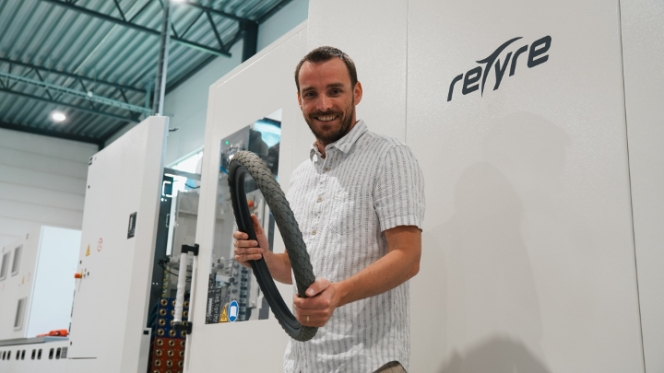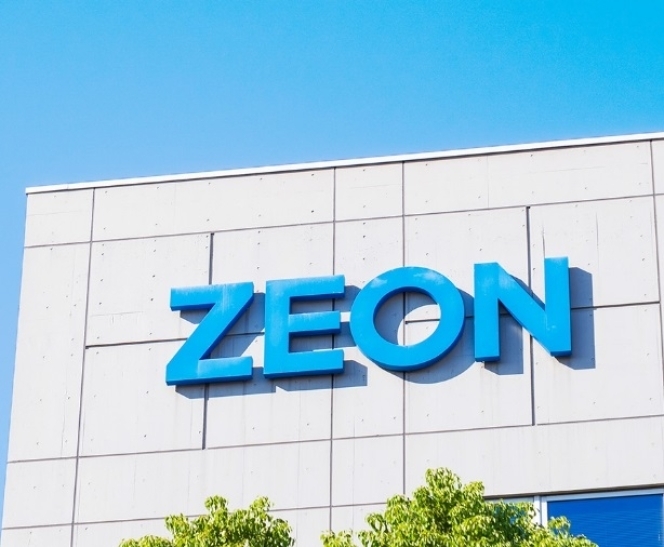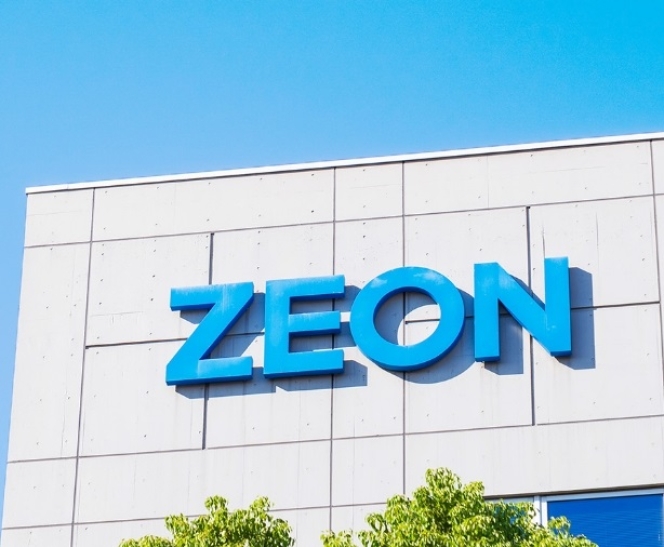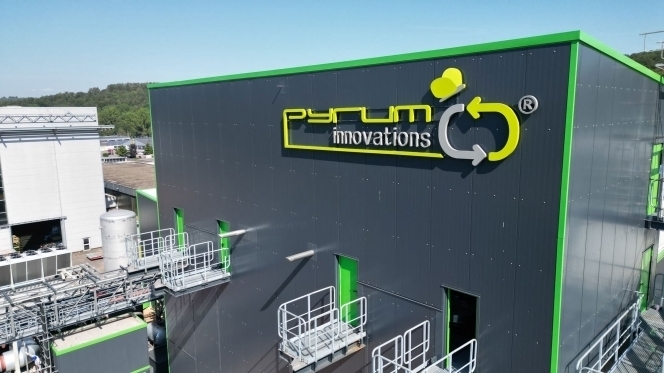reTyre Unveils World’s First Carbon-Neutral Tyre at Eurobike 2024
- By TT News
- July 03, 2024

reTyre, a sustainable tyre manufacturer, will unveil the world’s first carbon-neutral tyre at Eurobike 2024. This innovative concept tyre is made entirely from reclaimed materials, showcasing reTyre’s commitment to reducing emissions and revolutionising sustainable tyre production.
Sustainable materials for a greener future
The carbon-neutral tyre incorporates several unique materials, each chosen for its minimal environmental impact. Algae, sourced through controlled harvesting of blooms, helps restore aquatic ecosystems by preventing eutrophication and methane release. Recycled para-aramid, obtained from used body armour, is broken down and repurposed for the tyre’s beads and puncture protection, promoting a closed-loop recycling system and incorporating renewable carbon. Locally sourced post-consumer recyclate (PCR) with a low carbon footprint further minimises environmental impact. Finally, recycled fish nets collected from oceans are used for the tyre casing, leading to a 49 percent reduction in emissions and a 15 percent decrease in energy use compared to virgin materials.
Friedemann Ohse, who is leading the Carbon-Neutral Tyre Project at reTyre, elaborates on the meticulous process behind achieving carbon neutrality: “The product carbon footprint of this tyre is based on our third-party verified LCA, including the end-of-life, which is how we measure all our products. Our production and transportation processes are optimised to have close to zero emissions. End-of-life is reduced to almost zero due to the recycling of the tyres. The algae used in the tyre has a negative CO2 equivalent, balancing any remaining emissions to achieve a net-zero impact. This way, we have a carbon-neutral product without using well-known shortcuts, such as carbon quotas, subsidies, or other non-product-related contributions.”
Global collaboration for sustainability
reTyre partners with suppliers worldwide to ensure the responsible sourcing of materials. The UN Ecosystem Restoration Programme supports algae harvesting from lakes and oceans across the globe.
Sustainable tyres without compromise
reTyre offers a comprehensive portfolio of 100 percent sustainable products, providing brands with high-quality, eco-friendly tyres. Bio-based and fully renewable materials, never before used in pneumatic tyres, significantly reduce emissions. Additionally, a third-party-verified life cycle assessment (LCA) confirms an 82 percent reduction in greenhouse gas emissions compared to conventional tyres.
Ohse continues: “This carbon-neutral tyre is at a concept stage, and it is a result of continuous innovation that shows what our unique manufacturing is capable of.”
Beyond innovation: a full range of sustainable options
Alongside the groundbreaking carbon-neutral tyre, reTyre will showcase its entire range of sustainable products, including the new City Range bicycle tyre models explicitly designed for urban riders. These tyres boast bio-based and sustainable materials utilising reusable plant-based elastomers, new tread patterns for enhanced performance and grip, and matching performance to standard tyres, ensuring a smooth, eco-friendly cycling experience. The City Range also features a low carbon footprint throughout production and the product lifecycle and is fully reusable, setting a new benchmark in tyre sustainability. For complete data transparency, reTyre provides comprehensive compliance and sustainability tracking information.
reTyre’s entire product range prioritises sustainability and reusability, a unique proposition in the tyre industry. This commitment ensures that every component can be fully recycled and repurposed, fostering a closed-loop system that benefits the environment.
Zeon And Visolis Sign Binding Term Sheet To Advance Bio-Isoprene And SAF Commercialisation
- By TT News
- February 16, 2026

Zeon Corporation and Visolis Inc. have formalised their partnership by signing a binding term sheet, marking a pivotal advancement in the commercialisation of bio-based isoprene monomer and sustainable aviation fuel (SAF).
This collaboration, which now moves from technology verification towards project implementation, is built upon the progress made since their initial memorandum of understanding in March 2024 and the subsequent joint feasibility study announced in April 2025. Bio-based isoprene monomer serves as an essential component in the production of synthetic rubbers and various other materials, while SAF is increasingly recognised as a critical next-generation fuel for reducing carbon emissions within the aviation industry.
The newly established term sheet outlines a foundational agreement on the key elements required for a final investment decision. These include defining the business structure and the respective roles of each company, establishing technology and development strategies and advancing detailed engineering for the proposed production facility. Furthermore, the agreement covers the evaluation of potential sites, the process for engaging with suppliers, securing necessary regulatory approvals and planning the financing pathway.
The envisioned facility is set to commence commercial-scale output after successfully demonstrating mass production capabilities for biomass-based isoprene and SAF, utilising Visolis’ proprietary technology. Both companies are now committed to expediting the path to full-scale production and ensuring a steady supply of these sustainable products to the global market.
Zeon Backs Chemify To Accelerate Digital Chemistry Innovation
- By TT News
- February 12, 2026

Zeon Corporation has deepened its commitment to digital chemistry through a strategic investment and partnership with Chemify Limited, secured via its corporate venture arm Zeon Ventures Inc. Chemify, a growth-stage UK enterprise, is reshaping molecular research by integrating digital tools with automated laboratory systems. Its proprietary Chemputation technology translates molecular targets into executable chemical code, which operates directly on robotic platforms to complete integrated Design–Make–Test–Analyze cycles without manual intervention. This closed-loop automation allows Chemify to explore previously inaccessible areas of chemical space while reducing the timeline from concept to synthesized compound by up to tenfold.
A cornerstone of Chemify’s capability is its recently inaugurated Chemifarm in Glasgow – one of the most sophisticated automated facilities in the world for molecular design and construction. The facility enables accelerated iteration and autonomous synthesis of novel small molecules, converting chemical code into tangible compounds with unprecedented efficiency. These advances are critical for developing functional, synthesisable molecules that can contribute solutions to urgent global issues spanning public health, energy efficiency and environmental protection.
Zeon has been at the forefront of adopting digital methodologies in chemical R&D, recognising their transformative potential from an early stage. This investment is positioned to strengthen Zeon’s internal digital chemistry efforts and catalyse the invention of novel materials capable of addressing complex societal needs. The move aligns with Zeon’s STAGE30 corporate strategy, which targets a rise in revenue contribution from four key growth sectors – Mobility, Healthcare and Life Sciences, Telecommunications and Green Transformation – to 48 percent by fiscal 2028. By backing pioneering enterprises and cultivating advanced materials, Zeon continues to advance its dual vision of a sustainable planet and a secure, progressive society.
- Rubber Board Of India
- Rubber Producers’ Societies
- Sulphur Dusting
- Powdery Mildew
- Rubber Plantations
- Rubber Board Subsidy
Rubber Board Announces Sulphur Dusting Subsidy For Rubber Producers
- By TT News
- February 09, 2026

The Rubber Board of India has announced the opening of an application window for financial aid for sulphur dusting to combat powdery mildew disease in rubber plantations for the year 2026. The scheme is open to all Rubber Producers’ Societies (RPS) operating in both traditional and non-traditional growing regions.
From 10 to 20 February 2026, eligible societies must submit their applications online through the 'ServicePlus' portal on the official Rubber Board website. Societies requiring help with the submission process are advised to contact their nearest Rubber Board regional office or field station, or to consult the board's website for further guidance.
French Recognition Of TPO Bolsters Pyrum's Circular Economy Model
- By TT News
- February 09, 2026

Pyrum Innovations AG has welcomed the official recognition by French authorities on 17 January 2026, which classifies tyre pyrolysis oil (TPO) as a legitimate raw material for the chemical sector. This pivotal regulatory milestone for pyrolysis oil derived from end-of-life tyres substantially enhances the product’s integration into established chemical value chains. It also provides greater predictability for future purchase and partnership frameworks, thereby accelerating the development of industrial material cycles.
For Pyrum, which processes scrap tyres through pyrolysis to recover pyrolysis oil, industrial carbon black and steel, this decision underscores the critical need for standardised and reliable regulatory conditions. Such clarity is fundamental for scaling investments, production volumes and supply chains, particularly as the chemical industry and circular economy converge. The establishment of clear product categories is essential to ramp up the market for high-quality recycled raw materials.
The company remains committed to tracking further developments in France and the wider European dialogue regarding the classification and application of recycled feedstocks. Pyrum’s overarching objective is to expand industrial-scale recycling solutions for scrap tyres. This regulatory progress directly supports the company’s mission to secure long-term, quality-assured supply agreements with partners across the chemical industry, thereby advancing a more sustainable and circular economic model.
Pascal Klein, CEO, Pyrum Innovations AG, said, “The decision in France is an important step for the industrial use of pyrolysis oil from waste tyres. It supports a trend that we are seeing in many markets, where the chemical industry is seeking reliable, technologically robust and clearly classified alternative raw materials.”







Comments (0)
ADD COMMENT